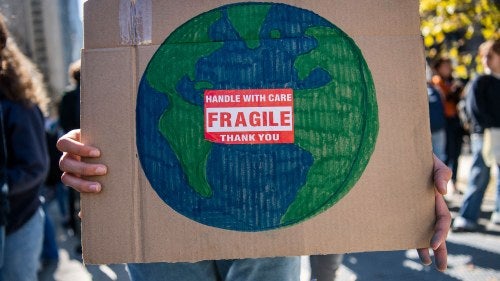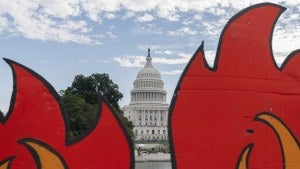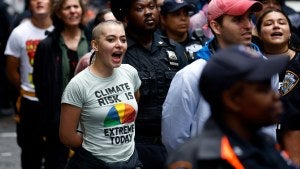Racial and Ethnic Differences on US Climate Policy

Americans of color tend to be more supportive of efforts to address climate change than White Americans.
Last year, the average global surface temperature reached a record high and breached the critical warming threshold of 1.5°C above pre-industrial levels, as set forth by the Paris Climate Accord. Though not a formal violation of the agreement, this breach is a warning that the Earth is heading in that direction. Natural disasters have become frequent occurrences, and concerns about the threat climate change poses and the efficacy of current climate policies continue to gain considerable momentum in public discourse.
In the United States, public opinion on climate change is shaped by a complex interplay of factors, including racial and ethnic background. To better understand how different groups in the United States think about this issue, the Chicago Council on Global Affairs and New America have partnered to conduct novel research on the views of various racial and ethnic communities in the United States as part of the 2023 Chicago Council Survey. Fielded September 7-18, 2023, the results provide valuable insights into how various racial and ethnic groups in America view climate change, potential policies, and the nation’s responsibility to invest in foreign climate relief.
White Americans Less Likely to Consider Climate Change a Critical Threat
Despite mounting evidence of climate change, many Americans remain skeptical of climate science and overlook the urgency of climate mitigation. While four in 10 Americans consider climate change to be a critical threat to vital US interests (39%), an equal amount thinks it is an important but not critical threat (39%). Nearly a third of Americans do not think it is an important threat at all (28%).
Perceptions of the threat posed by climate change varies across racial and ethnic groups, as Black, Hispanic, and Asian Americans are more likely to view climate change as a critical threat than White Americans. Majorities of Black, Hispanic, and Asian Americans contend that climate change poses a critical threat, while less than half of White Americans believe the same. In fact, a majority of White Americans think it is either an important but not critical threat or not an important threat at all.
Six in 10 Americans (57%) also believe that US leaders are not paying enough attention to climate change. This sentiment varies by race and ethnicity, with at least six in 10 Black (68%), Hispanic (65%), and Asian Americans (61%) sharing this view. While half of White Americans agree (49%), a sizable portion also believes that US leaders are giving too much attention to climate change (34%). White Americans are more likely than any other racial or ethnic group to hold this opinion.
Disparities in the perception of the climate change threat may exist due to a network of factors. From an intersectional perspective, communities of color and low socioeconomic status often face disproportionate exposure to environmental hazards and have fewer resources to cope with the adverse effects of climate change. The resulting environmental injustices can therefore heighten awareness and concern about the impacts of climate change among groups such as Black and Hispanic Americans.
Support for Domestic Climate Policies Vary Slightly by Race
Despite feeling less threatened by climate change than other racial and ethnic groups, the majority of White Americans support various policies aimed at reducing its global effects. From requiring businesses to incur the costs of recycling to mandating oil and gas companies to seal methane gas leaks, these proposals are backed by majorities of Americans from different racial and ethnic backgrounds with little variation. Still, support for these policies among White Americans tends to be lower than other groups, highlighting the differences in general perceptions of climate change between White Americans and Americans of color.
For instance, more than eight in 10 Americans overall favor requiring oil and gas companies to seal methane gas leaks (83%). Across racial and ethnic groups, Hispanic and Asian Americans (90% and 86%, respectively) are the most likely to support this policy, with Black Americans following at 81 percent. Though they are the least likely to support the measure, White Americans also strongly favor it (80%).
White Americans are also less likely than other racial and ethnic groups to support requiring businesses to produce recyclable packaging (63%). This trend is consistent when it comes to other environmental policies as well, such as deferring the cost of recycling to businesses rather than consumers and mandating that companies operating in the United States fund environmentally sound modifications to their operations.
By contrast, Hispanic and Asian Americans express the greatest support for implementing policies to reduce the effects of global climate change and are followed closely by Black Americans.
Americans of Color are More Likely to Support International Climate Aid
Developing policies to aid populations coping with climate disasters globally is equally important as addressing climate change mitigation domestically. Americans in the 2023 CCS were asked questions about potential US climate aid policies that would help nations disproportionately affected by climate change. With the exception of accepting climate refugees, majorities of Americans, regardless of race or ethnicity, support the proposed measures. However, across the board, White Americans the remain the least supportive.
When asked about whether the US should provide humanitarian aid like food and medical assistance, 85 percent of Americans responded favorably, making this the most-supported policy. Eight in 10 White Americans (81%) backed this policy, a margin of about 30 percentage points greater compared to their support for other proposals. In fact, this policy has one of the smallest variations of support between White and non-White groups.
Conversely, when asked about admitting climate refugees into the United States, a bare majority of Americans expressed support (52%), making this the least popular policy. It is also the only measure that most White Americans do not support (46%), whereas at least half of Americans of color in each group support accepting climate refugees.
Policies involving foreign economic aid maintain comparable levels of opposition to that of admitting refugees. When asked if the US should invest in vulnerable countries to build climate-resilient infrastructure, six in 10 respondents overall supported this policy, with White Americans supporting it the least (52%) and Hispanic Americans the most (72%).
Why are White Americans Less Likely to Support Climate Action?
In examining the nuances of public opinion on climate change, a consistent trend arises: lesser support for combatting this issue by White Americans than other groups. While there is no one clear answer, a multitude of socio-political factors, such as partisanship, play a significant role here.
White Americans are more likely than any other group to identify as Republican or right-leaning, political groups that traditionally exhibit more skepticism towards climate change and less support for climate-related measures. In the 2023 Chicago Council Survey, 81 percent of Republicans identified as White, making this racial group the most likely of any other to identify with this political party.
| Race and/or Ethnicity | Republican | Democrat | Independent | Refused | All |
|---|---|---|---|---|---|
| White, Non-Hispanic | 81% | 47% | 63% | 59% | 62% |
| Black, Non-Hispanic | 2% | 21% | 12% | 8% | 12% |
| Asian or Hawaiian/Pacific Islander | 5% | 9% | 6% | 9% | 7% |
| American Indian or Alaska Native | 1% | 1% | 2% | 5% | 1% |
| Hispanic | 11% | 22% | 17% | 19% | 17% |
In contrast, Black, Asian, and Hispanic Americans are more likely to identify as Democrats, who more so view climate change as a critical threat and support mitigation policies. The 2023 survey data demonstrates this partisan divide, with eight in 10 Democrats viewing climate change as a critical threat (81%) as compared to just 16 percent of Republicans.
Climate change skepticism among Republicans is often fueled by ideological beliefs that emphasize limited government intervention, isolationism, and doubt regarding scientific consensus on climate change. As a result, Republicans—and White Americans—are also more likely than Democrats and Americans of color to view US contributions to international issues as a diversion of resources that could be used domestically. In fact, in a recent Pew Research survey, 70 percent of Democrats reported that dealing with global climate change should be a top long-range foreign policy priority for the US, as opposed to just 15 percent of Republicans.
Counter to the lived experiences of many communities of color (especially Black and Hispanic Americans), there is often a lack of direct, personal impact from climate change among White Americans, leading to lower levels of urgency and willingness for the United States to be a leader in climate action.
The Future of Climate Action in America
Looking ahead, it's clear that climate policymakers in the United States must navigate the varied perspectives and priorities brought to light by this Chicago Council Survey and other polls. The results reveal that there aren’t significant differences across racial and ethnic groups regarding climate change views. For the sizeable disparities that do exist, they are primarily between White Americans and Americans of color, rather than within the groups of Americans of color themselves.
Ethnic and racial variations in opinions on this issue highlight the importance of fostering an inclusive dialogue that addresses the interests of all communities. Ultimately, the challenge will be striking a balance that aligns national interests with global responsibilities, ensuring that the United States contributes positively to global climate action while also addressing domestic concerns.


Related Content
 Public Opinion
Public Opinion
The Council partnered with New America to explore how Americans across backgrounds view key issues facing the world today.
 Public Opinion
Public Opinion
Asian, Hispanic, and Black Americans are more likely to view climate change as a threat than Americans as a whole, data show.
 Public Opinion
Public Opinion
But a majority of Americans support efforts to mitigate its effects.

